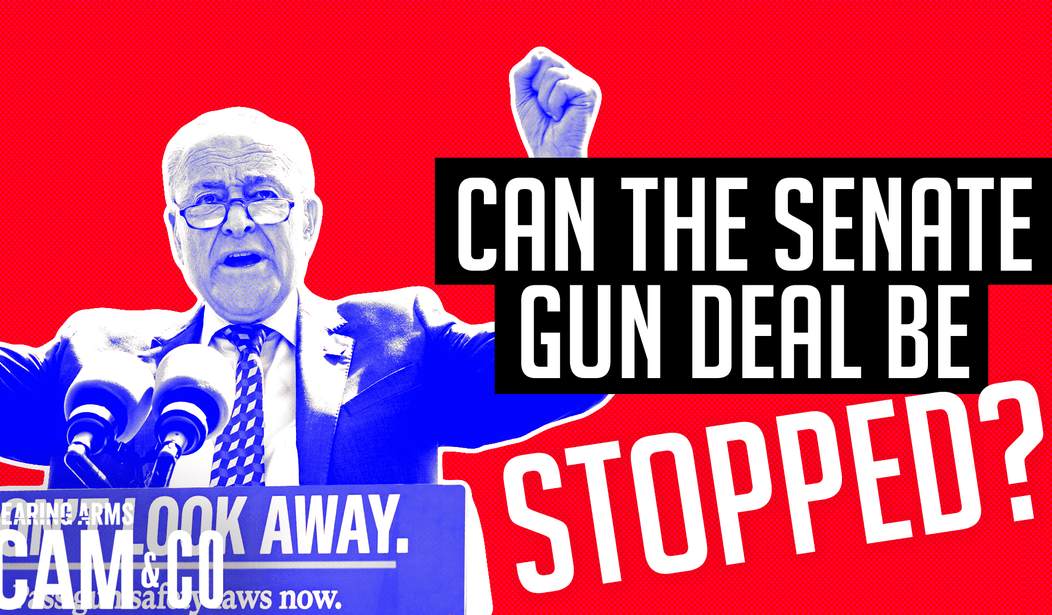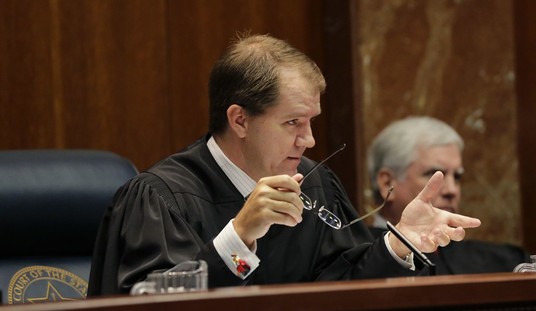With 10 Republicans agreeing in principle to a deal that includes increased spending on mental health and school security as well as offering grants to states that adopt “red flag” laws and including juvenile crime records in background checks on young adults who purchase firearms, there’s a lot of momentum at the moment, and if 2A activists are going to successfully sideline the legislation they can’t just talk to themselves.
I’ll say right up front that I’m not bullish on the prospects of defeating the bill or even substantially amending it to make it more palatable to Second Amendment supporters. The framework released on Sunday already involves “compromise” language; including juvenile records in background checks performed on adults under-21 who purchase firearms, for instance, instead of raising the age to purchase rifles and shotguns from 18 to 21. The incentives to states that adopt “red flag” measures are also a step removed from the federal “red flag” legislation approved by the House last week, and won’t necessarily lead to widespread adoption of the law, particularly given that most of the 19 states that have signed off on similar legislation are the low-hanging fruit for the gun control advocates hoping to enact them.
Still, with groups like the NRA and NSSF taking a “wait-and-see” approach to the actual text of the legislation, there’s still at least a sliver of doubt about the ultimate outcome of the framework agreed to by 10 members of the Senate’s Republican caucus, and once that text is released and available for review I suspect that some of the folks who are reserving their opinion will end up speaking out against the measure.
What they say and who their intended audience is could also have an impact. Like it or not, gun owners are not a numerical majority in this country, and even if we were, not every gun owner is a Second Amendment activist. If we’re only talking to ourselves or screaming at gun control activists, then we’re not helping our cause, especially in an emotionally-charged political environment like the one we’re in now.
There is one overriding issue that’s driving the Senate’s legislative response to the shootings in Uvalde and Buffalo, and it’s not public safety. It’s the midterms. The shootings do appear to have made even some Republicans more supportive of new gun laws, at least in theory (and likely temporarily), and that has probably helped move the needle in terms of senators willing to “do something” on guns as part of their legislative solution. Even in the Constitutional Carry state of Oklahoma, gun control has now become one of the top issues for voters, though it still trails jobs and the economy.
📊NEW: Gun control makes first appearance as a top priority for Oklahoma voters in @AmberIntegrated polling:
1⃣ Jobs/economy: 27% (top for R's, 33%)
2⃣ Education: 19% (top for D's, 27%)
3⃣ Gun control: 16% (top for I's, 28%)@OKCFOX pic.twitter.com/b7ricm98ML— Dan Snyder (@DanSnyderFOX25) June 13, 2022
The support among independents is a key factor as well when it comes to defeating any new gun control measures. That poll of Oklahoma voters, for example, found that gun control is a top issue for just 8% of Republicans (the same percentage as abortion, for what it’s worth), but that number jumps to 28% of independents. That’s actually three points higher than the 25% of Democrats in the state who named gun control as their top election year priority.
As the New York Times, of all places, recently pointed out, support for gun control legislation in public opinion polls doesn’t necessarily translate into support for specific policies when voters have a chance to cast their own ballots on the measure, but I think it’s fair to say that right now there are a whole lotta people who want to “do something” to prevent these types of shootings, and adding new restrictions on legal gun owners may indeed sound “reasonable” to non-gun owners or even gun owners who don’t care to delve too deeply into how these laws work in practice.
Both parties are trying to attract those independents to their side this November, and while Democrats have a harder job given Bidenflation, supply chain issues, and the growing likelihood of a recession in the coming months Republicans can’t just assume that undecideds and independents are going to break heavily in their direction on Election Day.
Most Second Amendment activists can cite statistics and anecdotal evidence showing that things like “red flag” laws, universal background checks, or gun bans aimed at legal gun owners don’t have a big impact on violent criminals, but those logical and rational responses likely leave a lot of those independent voters cold, because they don’t really speak to the emotional rhetoric driving the gun control side of the debate. If the question on the mind of those voters is “what are you going to do to stop another Uvalde from happening”, a response that’s centered on “well, we’re not going to subvert the Second Amendment” isn’t likely to resonate with many of them. A lot of these voters aren’t exactly demanding gun control, but they’re demanding lawmakers “do something,” and unless we’re a) willing to acknowledge the horrific nature of these attacks and b) present a non-gun control solution that is credible, effective, and constitutional, a lot of these folks in the middle are going to decide that a few “reasonable restrictions” that won’t impact them in the slightest is the most viable solution.
But that’s only one problem in terms of stopping the Senate’s gun deal, and arguably not the biggest issue. It’s no coincidence that none of the Republicans who’ve signed to the framework are running for election this year; four are retiring, and the other six won’t face their constituents for at least two years. As long as those ten are willing to stick by the supposedly modest restrictions they’ve already agreed to in principle, then the deal is likely to stick. Perhaps the best chance of seeing the deal scuttled is if Democrats overreach on specific legislative language, but even then I worry that the political impulse to “do something” is going to be the overriding concern of the ten Republican senators who’ve given their thumbs up to the deal. That being said, an agreement in theory isn’t a guarantee of passage, and there are plenty of specifics that will need to be addressed; each one another potential breaking point for the tentative deal.
How narrowly will a new definition of which sellers need federal firearms licenses be written? Are there limits on which juvenile records would be accessible during background checks for younger buyers?
What conditions would states have to meet to qualify for “red flag” funds? What legal protections would people have if the authorities consider them too risky to have firearms?
How much money will the package cost? No one has said, though people familiar with the discussions say a ballpark $15 billion is possible. And how will it be paid for?
A leader of the effort, Sen. Chris Murphy, D-Conn., told reporters Monday that bargainers plan to pay for the costs with offsetting spending cuts or new revenues. The latter could be a no-go for Republicans.
It sounds like even the senators who negotiated the framework are unclear of the details at the moment, even though they’re hoping to have a vote before the Senate recesses for Independence Day. There’s still a little time for the deal to fall apart, either of its own weight or because of voter backlash, but Second Amendment activists and other opponents definitely have their work cut out for them.









Join the conversation as a VIP Member